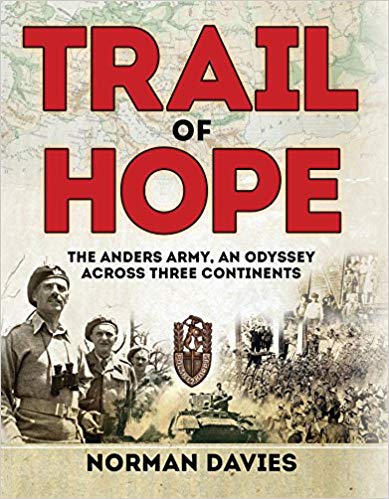AntiSemitism Anders Army Bogus Davies

Trail of Hope, by Norman Davies. 2015
Outstanding Mini-Encyclopedia on Polish KRESY Deportees. Holocaust-Related Statements on Poland Countered
By way of introduction, author and British historian Norman Davies has written fairly about Poland before, and has gotten in academic trouble for it. See my review of his GOD’S PLAYGROUND.
—–
In this outstanding work, Davies covers: The 1939 German-Soviet conquest of Poland, the deportation of a million Polish citizens to the interior of the USSR, the horrors of Soviet exile, the post-Barbarossa “amnesty” (which, in practice, freed only a fraction of the still-living Poles), the formidable challenges facing German Anders and his efforts to form a Polish army, the solidarity of Poles and Uzbeks in their respective fights for freedom (pp. 122-123), the peregrinations of the half-starving Polish refugees across western Asia, the Poles in Palestine and then Egypt, the Communist-inspired attacks of the British press on General Anders (p. 255), the Battle of Monte Cassino, the Churchill-Roosevelt betrayal of Poland at Teheran and Yalta and the ensuing permanent homelessness of Anders and the Kresy refugees, etc.
This book has many “extras”. This includes a profusion of photographs, interviews with surviving veterans, visits to the relevant locations, and seldom-discussed facts. For instance, ironic to the Communist propaganda, still repeated by cultural Marxists today, that Poland was a nation of feudal lords, 75% of Polish society consisted of peasants, and the nobility had been formally abolished in 1921. (p. 277).
General Sosabowski, who had been forced to retire (without pension) for his warning criticisms of General Montgomery’s ill-fated Operation Market Garden, finally got a statue, 60 years later, erected by grateful British veterans and local Dutch citizens. (p. 487). Sometimes, justice does happen.
This work has a place for a little levity—the account of Wojtek the Bear. (pp. 462-469).
SURPRISE. THE CHARGE OF ANTISEMITISM—YET AGAIN
This is not a book on Jewish-Polish relations, yet this elephant in the room subject keeps resurfacing owing to the nonstop Jewish propaganda directed against Poland (once again reaching a crescendo as I write this review in 2019).
Here is how historian Norman Davies handles this, “Yet it was bedeviled—as the historiography of the subject still is—by persistent charges of anti-Semitism. General Anders and his officers, it was said, did not want to accept Jewish recruits, and blatantly discriminated against them. Historians [e. g, Yisrael Gutman, p. 594], who should know better, often repeat the accusations at face value. In his otherwise brilliant memoir, WHITE NIGHTS, Menachem Begin has the chutzpah to state that ‘in essence Jews were not accepted; and he says it, knowing full well that he himself was taken on together with thousands of other Jews. On the other end of the scale, one can quote the testimony of Ambassador Mordechai Palzur, the son of Captain Alexander Plutzer: ‘We never experienced any form of maltreatment.’” (p. 87).
Polish Jews were left behind in the USSR, just like Poles, and each felt himself a victim of injustice. (p. 142). Jewish separatism, of one kind or another, had always been a factor in Jewish-Polish relations. While still in Russia, the Zionists had demanded that Polish Jews be allowed to form their own military units, and General Anders acceded to this request, as at Koltubanka. (p. 88). The British ordered it disbanded. Later, in Palestine, Polish Jews deserted en masse (pp. 389-on), while General Anders gave a secret order to turn a blind eye (p. 392), and Anders’ Poles did not mind Jews having the “privilege” of deserting. (p. 394).
Historian Norman Davies compares the Endeks to “right-wing Zionists who stress that Israel is a Jewish state and regard Arabs as undesirables.” (p. 286). However, characterizing National Democrats as ethnonationalists is, at best, is an oversimplification. For corrective, read my detailed English-language review, of POLSKA DLA POLAKOW.
To see a series of truncated reviews in a Category click on that Category:
- All reviews
- Anti-Christian Tendencies
- Anti-Polish Trends
- Censorship on Poles and Jews
- Communization of Poland
- Cultural Marxism
- German Guilt Dilution
- Holocaust Industry
- Interwar Polish-Jewish Relations
- Jewish Collaboration
- Jewish Economic Dominance
- Jews Antagonize Poland
- Jews Not Faultless
- Jews' Holocaust Dominates
- Jews' Holocaust Non-Special
- Nazi Crimes and Communist Crimes Were Equal
- Opinion-Forming Anti-Polonism
- Pogrom Mongering
- Poland in World War II
- Polish Jew-Rescue Ingratitude
- Polish Nationalism
- Polish Non-Complicity
- Polish-Ukrainian Relations
- Polokaust
- Premodern Poland
- Recent Polish-Jewish Relations
- The Decadent West
- The Jew as Other
- Understanding Nazi Germany
- Why Jews a "Problem"
- Zydokomuna